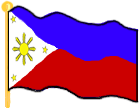Atin Cu Pung Singsing
"Atin Cu Pung Singsing" is a folk song that's sung by adults and children.
Atin Cu Pung Singsing
I Once Had a Ring
Folk Song
Folk Song
(Kapampangan)
(English)
Atin ku pung singsing
Metung yang timpukan
Amana ke iti
King indung ibatan.*
Sangkan keng sininup
King metung a kaban
Mewala ya iti,
E ku kamalayan.
Ing sukal ning lub ku
Susukdul king banwa
Pikurus kung gamat
Babo ning lamesa.
Ninu mang manakit
King singsing kung mana
Kalulung pusu ku
Manginu ya keya.
I once had a ring
That had a single gem
I inherited it
From my father*.
I thought I hid it
In a chest
But it disappeared
Without my knowledge.
My despair was so great
It reached the heavens
I clasped my hands**
And placed them upon the table.
Whoever finds
The ring I inherited,
My poor heart
Will worship him.
Notes
*Manuel translated this as "father", but I noticed all over the internet it's translated as "mother". I asked Manuel about this and here's what he wrote, "People are confused about the translation of who gave the ring to the singer. Literally, it's the father (indung). Then again, it's usually a female relative who bequeaths or gives a ring to a woman (i.e., daughter, niece)."
Carla wrote, "The line 'Keng indung ibatan' is currently translated as 'from my father' as 'indung' is father. However, the phrase 'indung ibatan' refers more to an ancestral relative such as a great-grandmother or great-grandfather, suggesting that the ring is an heirloom. It's a very old way of speaking the Kapangpangan dialect. My dad taught me this song as a little girl."
**To pray
*****
Ernie wrote to me, "...it is a song I learned as a little boy growing up in Lubao, Pampanga, Philippines, the hometown of Gloria Arroyo, the President of the Philippines".
Comments
Manuel wrote the following when I asked about this song: "I'm familiar with that song. It's in Kapampangan, and its tune is the one copied by 'Ako Ay May Lobo'.
It's difficult to translate that song line by line, because Filipino and even Kapampangan make use of reverse order in sentences.
We can change the translation (and still make it correct)."

Thanks!
Thanks and Acknowledgements
Many thanks to Ernie for contributing this song. Thanks to Manuel Viloria for letting me use his translation (which I edited above) from his blog post Philippine Folk Song: Atin Ku Pung Singsing and for commenting on this song. Thanks to Carla Ocampo for writing about the meaning of "Keng indung ibatan".
Salamat pu!

























